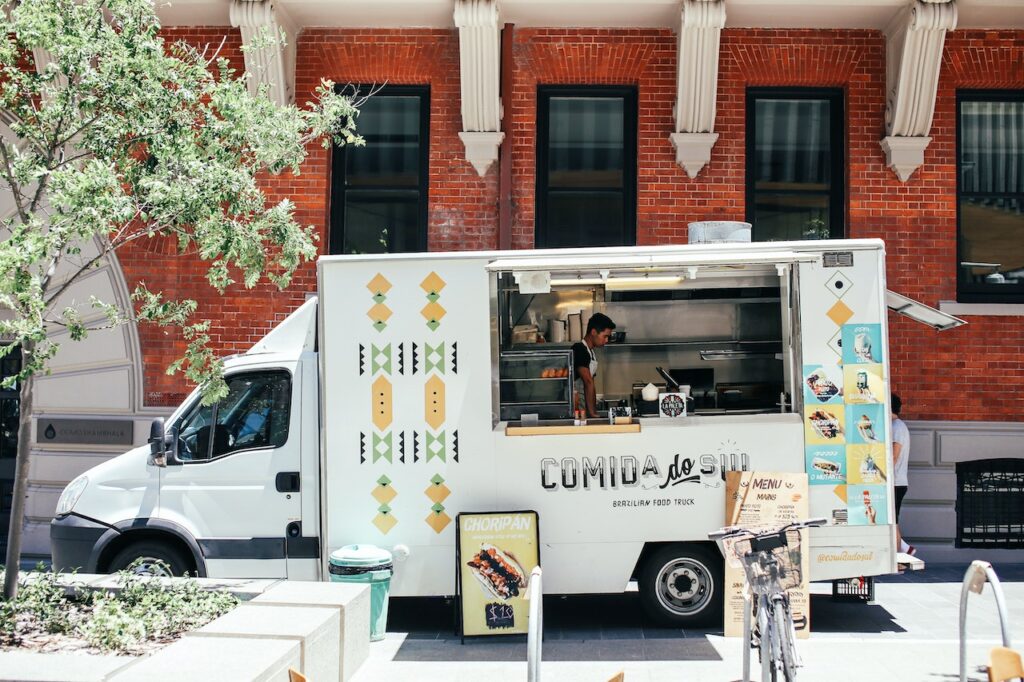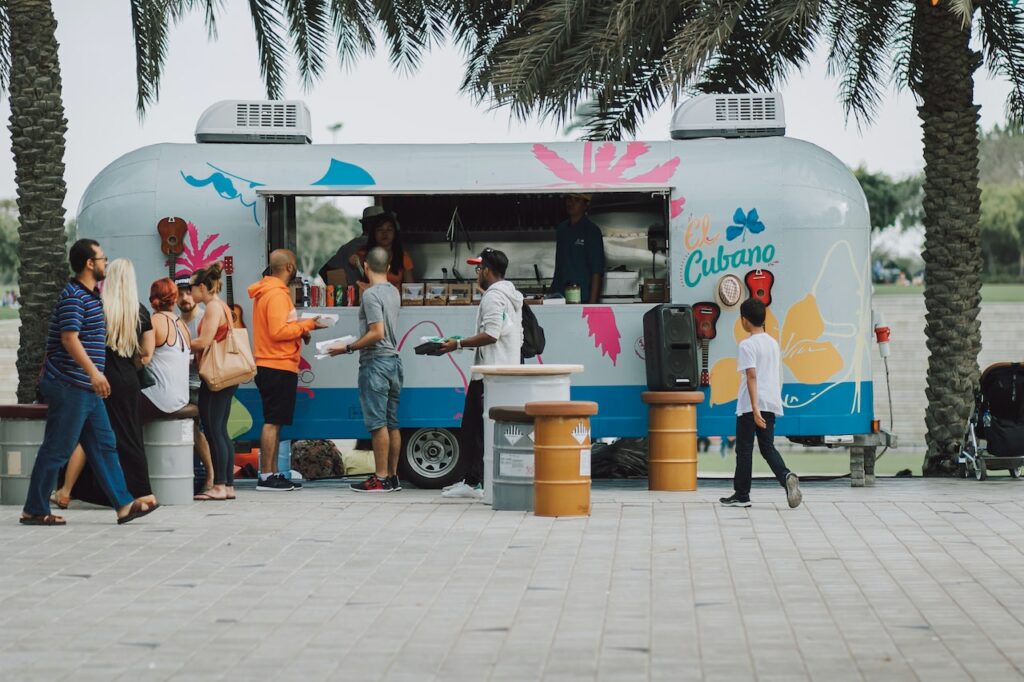Ultimate Guide to Food Truck Insurance (Business Start-ups)
Insurance for a food truck business is essential, not just as a legal necessity, but also to protect your financial interests. As with any business, food truck ventures are exposed to various risks. The specific nature of a food truck business, which includes mobility, food service, and customer interactions, creates unique exposures. These can result in financial losses due to liability claims, property damage, and business interruption. This article provides a comprehensive overview of food truck insurance, types, and the factors affecting insurance costs.
*Blastoff creates websites for local food trucks at affordable prices! If you need one for your food truck, contact us!
What is Food Truck Insurance?
Food truck insurance is commercial insurance designed to cover the unique risks of running a food truck business. These risks range from automobile accidents to food-borne illness claims, property damage, equipment breakdown, etc. The right coverage will help you manage these risks without disrupting your business operations.
Why Do You Need Food Truck Insurance?

The simple answer is to protect your business. The food truck industry has its fair share of potential hazards. An accident while driving the food truck, a kitchen fire, a customer slip-and-fall, or a food-borne illness can result in significant financial losses. By having insurance, you protect your business from such losses.
Certain types of insurance are a legal requirement for food truck businesses in many states. For instance, commercial auto insurance is required by law in most states. Additionally, if you have employees, you are often required to have workers’ compensation insurance.
Many landlords, event organizers, and commissaries (commercial kitchens where food trucks prepare their food) require food trucks to carry specific liability insurance as a condition of doing business with them.
How Much is Food Truck Insurance?

1. Commercial Auto Insurance
This is the most basic type of insurance for a food truck because it operates on wheels. It covers liability for property damage and bodily injuries that you cause to other people in an auto accident. It can also protect your food truck if damaged in an accident.
On average, you might expect to pay between $2,000 to $3,000 per year for commercial auto insurance for a food truck. This policy typically covers damages to your vehicle in the event of an accident and bodily injury or property damage to others caused by your car.
2. General Liability Insurance
This insurance protects your food truck business from third-party claims for bodily injury, property damage, and personal and advertising injury. For example, if a customer slips and falls while ordering food from your truck and decides to sue, general liability insurance typically covers the costs.
This insurance costs around $500 to $1,000 per year on average. It protects you from claims of third-party bodily injury, property damage, and personal and advertising injury.
3. Product Liability Insurance
As a food truck operator, you serve food and drinks that people consume. If a customer gets sick from eating your food, they could sue. Product liability insurance covers claims of bodily injury or property damage caused by products you sell or supply.
This is often included as part of a general liability policy. If it’s not, or if you need more coverage, product liability insurance might cost an additional $1,000 or more annually.
4. Workers’ Compensation Insurance
Workers’ compensation insurance is usually required by law if you have employees working on your food truck. This insurance covers medical expenses and lost wages if an employee is injured or becomes ill due to their work.
If you have employees, you’re required to have this insurance in most states. The cost will depend on the number of employees and the nature of their tasks, but it could easily amount to $2,000 or more per year.
5. Property Insurance
Property insurance covers your business property, such as kitchen equipment and inventory, from loss or damage caused by fire, theft, or vandalism.
This insurance typically costs a few hundred dollars per year. It protects your equipment and inventory from damages caused by fire, theft, or vandalism.
6. Business Interruption Insurance
If a covered event forces your food truck to close temporarily, business interruption insurance can cover your lost income during the downtime.
This insurance is often bundled with a property insurance policy. It might cost around $750 to $1,200 per year if purchased separately.
7. Equipment Breakdown Insurance
This coverage helps repair or replace your kitchen equipment if it breaks down. Given the significant investment in kitchen equipment for a food truck, this is essential coverage for many businesses.
This type of insurance can also be bundled with property insurance or bought separately for about $500 to $1,500 per year.
The total average cost of a comprehensive food truck insurance package might range from $4,000 to $7,000 per year. Remember, these are rough estimates, and your price could be lower or higher. Be sure to get quotes from multiple insurers to compare rates and coverage options.
Factors Affecting Food Truck Insurance Cost
The cost of food truck insurance is based on a variety of factors, including
- Type and Amount of Coverage
More comprehensive coverage will cost more. Additionally, higher limits of insurance also result in higher premiums. - Value of Your Food Truck
The more expensive your food truck and equipment are, the more it will cost to insure them. - Location of Your Food Truck
The areas where you operate can affect your insurance cost. You can expect higher premiums if you work in areas with high accident or crime rates. - Driving Records
Your commercial auto insurance premiums will be higher if you or your employees have poor driving records. - Business Experience
Insurance companies often offer lower premiums to businesses with more experience. If you are starting out with a food truck, you can expect to pay more. - Claim History
If you have a history of insurance claims, insurers will likely charge you more because you pose a higher risk.
How to Get Food Truck Insurance

When seeking insurance for your food truck business, working with an insurance agent or broker who is familiar with the food truck industry is essential. They can guide you in choosing the right coverage for your specific needs.
Some potential companies that you can look into are
- Progressive Commercial
Progressive is one of the largest providers of commercial auto insurance in the United States, and they offer a customized food truck policy that includes commercial auto coverage, business owners’ policy, workers’ compensation, and more. - CoverWallet
CoverWallet specializes in small business insurance, and they can provide a variety of coverage types for food trucks, including auto liability, general liability, workers’ compensation, and property insurance. - Insure My Food
This company specializes in food truck insurance, offering comprehensive packages that include product liability, general liability, auto insurance, and property coverage. They are well-versed in the unique needs of food truck businesses. - FLIP (Food Liability Insurance Program)
FLIP specializes in liability insurance for food businesses, including food trucks. They offer general liability, product liability, and additional coverage options such as equipment coverage. - Nationwide
Nationwide offers a comprehensive business insurance solution suitable for food trucks. Their policies include business auto insurance, general liability, property insurance, and workers’ compensation. - State Farm
State Farm is a well-established insurer offering a range of commercial insurance options. They can provide property, liability, commercial auto coverage, and more. - Geico
Known for their auto insurance, Geico also provides commercial auto insurance that could be used for food trucks. They also partner with other insurance companies to offer general liability and different types of business insurance. - Farmers Insurance
Farmers offer customizable policies for food truck businesses, including commercial auto insurance, general liability, property coverage, and workers’ compensation.
Start by getting several quotes. Compare not just the premiums but also the coverage details. Make sure you understand what is covered and what is excluded. Feel free to ask questions if something needs to be clarified.
In addition to providing information about your food truck, such as its value and the locations where you operate, you’ll also need to give details about your business operations. This includes the types of food you serve, your hours of operation, and whether you have employees.
Remember to be honest when providing information for insurance quotes. If you provide incorrect information and then need to file a claim, the insurance company could deny the claim or even cancel your policy.
Best Practices for Managing Insurance Costs

1. Safety First
Make safety a priority in your operations. This includes safe driving practices, food handling, and employee safety training. Preventing accidents and claims can help keep your insurance costs down.
2. Choose Deductibles Wisely
Higher deductibles can lower your premium. However, please ensure you can pay the deductible if you need to file a claim.
3. Regularly Review Your Coverage
Your insurance needs will likely change as your business grows and changes. You can just make it a habit to review your coverage at least once a year.
4. Ask About Discounts
Many insurance companies offer discounts for things like having safety features on your truck, having a clean driving record, or buying multiple types of insurance from the same company. You can ask your insurance agent or broker about potential discounts!
Summary
Food truck insurance is a vital aspect of running a food truck business. It protects your business from potential risks and helps ensure that unexpected events don’t lead to significant financial losses. By understanding the types of coverage available, the factors that affect insurance cost, and the process of getting insurance, you can make informed decisions that protect your business and investment.
*Blastoff creates websites for local food trucks at affordable prices! If you need one for your food truck, contact us!
